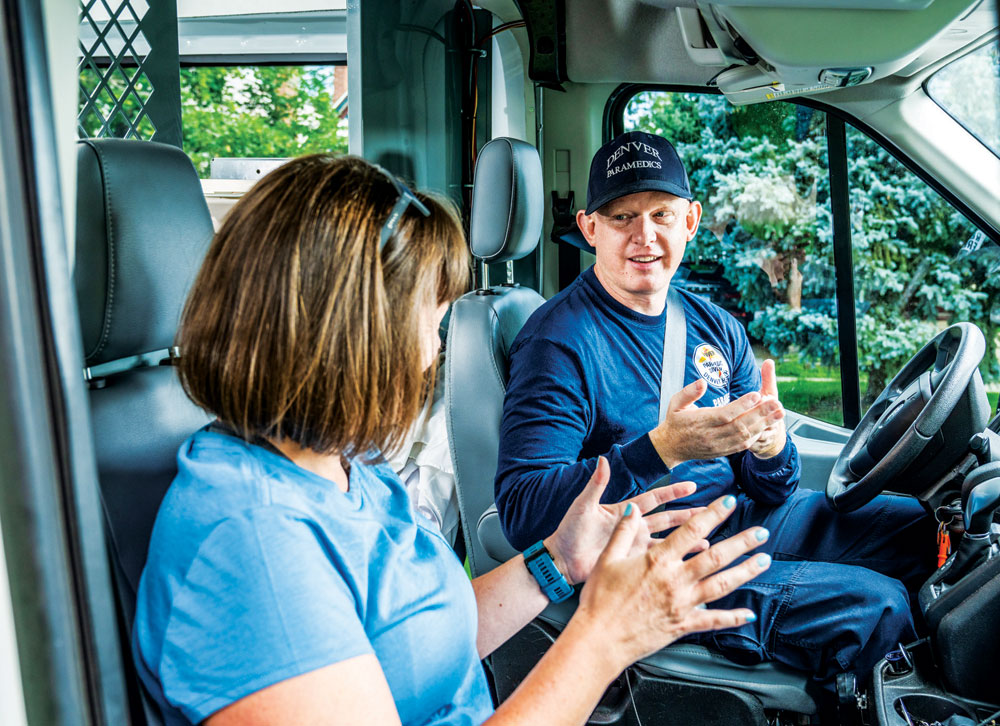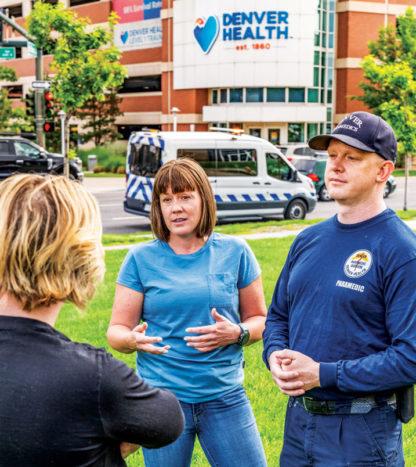Front Porch (Northeast Denver)
April 1, 2022 / Tracy Wolfer Osborne / Announcements, Community Issues, Denver News, Health & Wellness /

Mamie Tissue, a clinician with the Mental Health Center of Denver, and her partner, Seth Humphreys, a Denver Health Paramedic discuss a call in their STAR van. They are one of eight STAR teams who respond to calls dealing with mental health issues, homelessness, poverty and substance abuse.
Denver’s program that sends mental health pros instead of police on 911 calls is expanding after proving itself a big success.
The STAR program (Support Team Assisted Response), launched in June of 2020, currently has three vans and eight teams that run from 6 a.m. to 10 p.m. seven days a week. Each team consists of an EMT and a mental health clinician. By August of this year, STAR plans to increase to 10 teams and five vans.

Tissue and Humphreys use a stand-in to demonstrate how they use de-escalation techniques to calm a person down. The STAR teams help problem-solve through issues and connect people to support, often giving them rides to a relative’s house, a homeless shelter or the Behavioral Health Solutions Center.
Unlike police who must look at things through a law-enforcement lens, STAR is not punitive. According to a pubic relations specialist for the Denver Department of Public Health and Environment that oversees STAR, of the almost 3,000 calls they’ve responded to since June 2020, none has resulted in injury or arrest. STAR has never needed to call the police for backup.
Although officially born during the defund-the-police movement of 2020, the idea for STAR came years before, and the program has never siphoned money from the police. The pilot for STAR was funded through Caring for Denver, a taxpayer-funded foundation that combats mental health issues and substance misuse. STAR’s expansion is funded through the city’s general fund and Caring for Denver.
Denver Police Chief, Paul Pazen, is fond of the program that he helped launch. He said the police have more than enough work fighting violence and property crime and maintaining traffic safety. STAR provides needed relief to DPD to confront those more serious criminal—not mental health—issues.
Early on, programs like STAR faced skepticism. Critics said sending mental health professionals instead of police was akin to bringing a knife to a gunfight. But STAR doesn’t go to gunfights or knife fights for that matter.
Most of STAR’s calls involve trespass or an unwanted person; all of them involve elements of mental health, homelessness, poverty and substance abuse.
Approximately 30 percent of STAR’s calls are initiated by police who arrive first on the scene, assess the situation and then determine STAR is more appropriate to handle the call.
STAR teams arrive in an unmarked van wearing plain clothes. They come equipped with granola bars, sanitary napkins, water, first-aid.
A recent, typical call involved a belligerent man outside a 7-Eleven store. He was upset because he was unhoused, had lost his ID, so the STAR teams connected him with people who got him a new ID.
“A lot of times it’s just about problem-solving through things, removing the roadblocks that are in people’s way,” said a public relations specialist for Denver’s health department .
Before STAR, 911 calls were routed to either the police, EMTs or a fire station. People in crisis often ended up in jail or the emergency room that are places ill-equipped to assist them.
Stephanie Van Jacobs, the program manager who oversees the mental health clinicians, said STAR has full discretion and creativity to resolve calls any way they see fit.
“There are no restrictions on where we can transport someone,” Van Jacobs said. “If people have fallen out of the system, we’ll reconnect them to their social worker. We get calls from the VA, too, asking if we’ve seen certain people.
“We’ll give rides to homeless shelters, relative’s houses, anywhere we can connect people to the help they need,’’ she said. “We drop a lot of people off at the Behavioral Health Solutions Center.”
The Behavioral Health Solutions Center, which opened last year, is run by the same mental health agency that runs STAR. It offers a crisis stabilization clinic which allows people to stay for five days and a transitional shelter which allows people to stay for 30 days. Services include private bedrooms, meals, inpatient and out-patient treatment, transportation and transitional support to community living including help with job and housing security.
STAR is a partnership between the Mental Health Center of Denver, Denver Police Department, Denver Department of Public Health and Environment, Denver Health Paramedics and other community organizations. To learn more about STAR go to www.mhcd.org/behavioral-health-solutions-center. To learn more about the Behavioral Health Solutions Center go to www.mhcd.org/star-program.
Photos courtesy of Denver Health